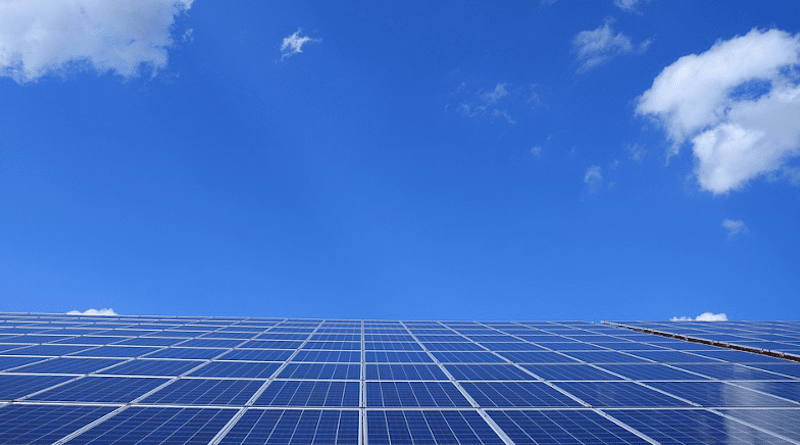Unshackling Workers In China’s Solar Supply Chain – Analysis
By Joseph Negrine
Opponents of China’s solar manufacturing industry, including US and Germanmanufacturers, believe that human rights are currently at odds with the renewable energy transition. To achieve a just transition, it is imperative for nations to cooperatively protect the wellbeing of affected workers when addressing environmental problems.
Solar energy is critical to the renewable energy transition. China dominates this industry, accounting for over 80 per cent of production in all manufacturing stages of the solar supply chain. Within China, the Xinjiang Uyghur Autonomous Region produces approximately 35 per cent of the world’s polysilicon, a key material in solar modules.
The Chinese government faces ongoing international scrutiny for alleged human rights abuses against the Uyghurs — the region’s ethnic group — including accusations of forced labour. In 2020, the Australian Strategic Policy Institute identified 82 companies that were ‘potentially directly or indirectly benefitting from … abusive labour transfer programs’ in Xinjiang. Implicated companies included Amazon, Uniqlo and Volkswagen.
More reservedly, the Office of the UN High Commissioner for Human Rights called on the Chinese government to clarify that its labour and employment schemes align with international law. This followed the Commissioner’s visit to Xinjiang in May 2022, where the investigation raised concerns about the labour schemes.
In response, the Information Office of the People’s Government of Xinjiang Uygur Autonomous Region released the Truth and Facts report, denying all claims of forced labour. The report emphasised the alignment of Xinjiang’s labour and employment policies with international law and claimed that the government’s vocational education and training programs had improved socioeconomic outcomes across Xinjiang. The report also accused companies divesting from Xinjiang over forced labour concerns as guilty of human rights violations due to the ‘forced unemployment’ and ‘forced impoverishment’ caused by their exit. The truth likely lies somewhere between these diametrically opposed narratives about Xinjiang’s working conditions.
US President Joe Biden administration’s Uyghur Forced Labour Prevention Act, which came into force in 2022 to prohibit the importation of goods produced with forced labour in Xinjiang, has driven companies’ divestment. Despite concerns about their effectiveness, the Act uses import restrictions to incentivise the eradication of forced labour in supply chains. It contains a rebuttable presumption that any goods mined, produced or manufactured in Xinjiang are made with forced labour, barring them from US importation. Companies bear the onus of assessing their supply chains and proving that products entering the US market are free from association with forced labour.
This has introduced a significant regulatory burden in the solar industry. The Act applies whether goods are made wholly or partly in Xinjiang. Crucially, at least 95 per cent of the silicon-based solar module market — one of the Act’s high-priority sectors for enforcement — contains some Xinjiang polysilicon.
Across the pond, the European Union proposed a regulation in September 2022 that would similarly prohibit the importation of products made with forced labour into the EU market. It is currently uncertain whether the proposed EU regulation will presume that goods produced in Xinjiang involved forced labour. What is certain is that the regulatory costs of noncompliance increase as more countries implement due diligence laws for supply chains. This incentivises companies to relocate their operations to areas where human rights abuses are perceived to be lesser.
Senior EU figures have encouraged European companies to distance themselves from Xinjiang if they have any doubt about labour violations. Concerns about China provide a convenient justification for economies to strengthen their market share in the growing solar industry — something Australia is seeking to do.
While supply chain due diligence can assist in managing human rights risks, its effectiveness requires transparency and, more importantly, trust. The ethical sourcing of materials and labour in the solar industry requires importing companies to have traceable supply chains and exporting companies to be transparent about labour conditions.
Transparency is a necessary but insufficient condition for successful due diligence. To rebut the US presumption, companies must document the conditions of workers and establish that no forced labour was used at any point in the production process. This evidentiary bar is high, undergoing scrupulous consideration by the US Department of Homeland Security.
Without trust from importing nations, measures to increase transparency are undermined. Loning’s independent audit of Volkswagen’s Xinjiang site, part of a joint venture with SAIC Motor, revealed the epistemic challenges of due diligence in China. The audit investigated the labour conditions of the site’s 197 employees, finding no evidence of forced labour. Subsequently, Human Rights Watch cast doubt on the veracity of audits in Xinjiang due to the risk of retaliation against auditors and audited employees. Human Rights Watch believed that, even if external actors successfully identified the existence of such violations, Xinjiang authorities would not respond to these concerns.
The situation in Xinjiang, unfortunately, appears intractable. Without sufficient trust in transparency-boosting measures, Western divestment is likely to continue. This in turn will continue to stoke geopolitical tensions concerning alliances with China. Whether Uyghurs work freely or by force, economic headwinds will jeopardise their employment prospects. And in a more fragmented international arena, we should question whether superpowers will be able to set aside their differences to advance both environmental and social imperatives.
- About the author: Joseph Negrine is a Bachelor of Laws (Honours) student and Tuckwell Scholar at The Australian National University.
- Source: This article was published by East Asia Forum

